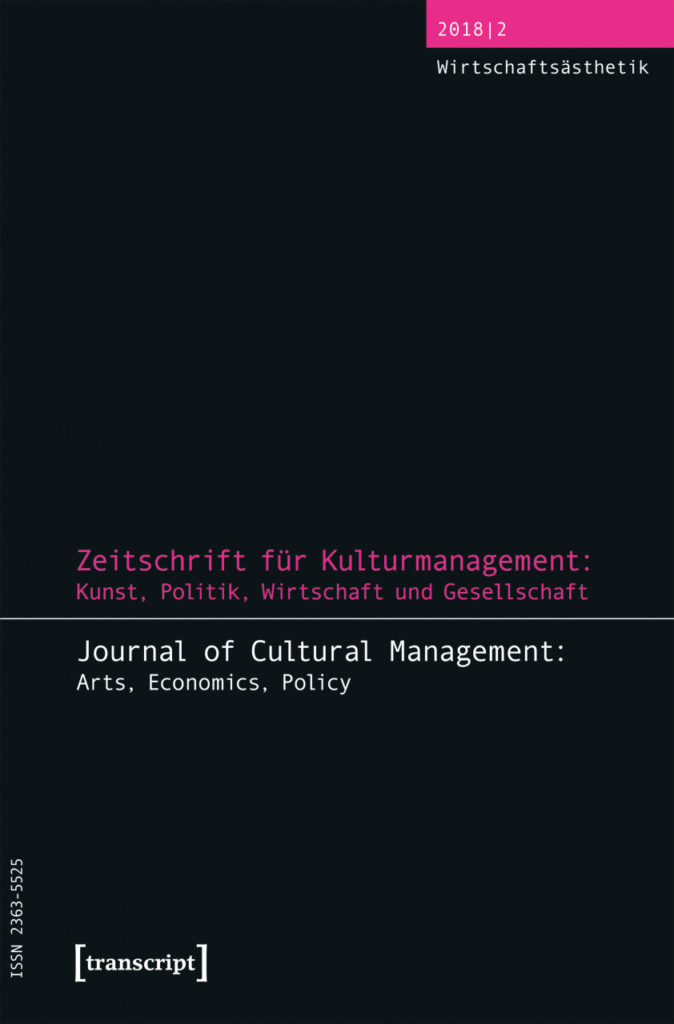Research Article
Setting the Stage for Something New
Understanding Arts-Based Initiatives through the Lens of Liminality and Rites of Passage
Abstract
Art is brought into organizations in the shape of “artistic interventions” in order to achieve a variety of effects: creating new values, initiating learning processes, supporting restructuring processes, or fostering innovation. Several methods and practices have been developed for this purpose, in which art or artistic workshops create spaces promoting precisely these effects. Such learning spaces, experimental spaces and memory spaces pose great potential for personnel and organizational development, in that, e.g., new ideas can be developed and internalized. Based on the idea of spaces created by artistic interventions, this article analyses them from the theoretical perspective of “liminality”. This theoretical angle helps to fathom the effects experienced in artistic interventions which are difficult to evaluate. This way, the situation in which employees and themselves in artistic interventions can be framed to better understand processes of change and the opening for exploration of ideas. In addition, liminality is linked to the anthropological view of “rites of passage” (transition rites), which facilitate times of change and mark – or even constitute – transitions.
Keywords
2018 (2)
Wirtschaftsästhetik

Related Articles
Analysis of the Market Environment in the Fields of Music Agencies
Yearbook for Culture Management 2013
Research Article
Wertesysteme von Kulturmanagern
Eine explorative TypologieYearbook for Culture Management 2010
Research Article
Journal of Arts Management and Cultural Policy 2020 (1)
Research Article
“Light” of Social Change in Florence’s Social Shrinking Spaces.
Project Lumen as Model.Journal of Cultural Management and Cultural Policy
Case Study
Yearbook for Culture Management 2013
Research Article
‚Creative Quarters‘ und die Paradoxie von Stadtplanung
Yearbook for Culture Management 2011
Research Article
© 2026, Journal of Cultural Management and Cultural Policy
Keywords
- Aesthetics
- Higher Education
- Cultural Diplomacy and Foreign Cultural Policy
- Occupation
- Career and Professional Role
- Audience Development
- Audience Studies and Visitor Studies
- Visitor Motivations
- Business
- Covid Pandemic
- Democracy
- Digitalization
- Diversity
- Third Sector
- Empirical Aesthetics
- Development
- Ethics
- Evaluation
- Field Theory
- Festival
- Film
- Federalism
- Community Arts
- Societal Change
- Ideology
- Staging
- Career
- Communication
- Concert
- Creative Industries
- Creativity
- Crisis
- Culture
- arts organizations, cultural organizations
- Cultural Participation
- Cultural Change
- Fincancing The Arts
- Cultural Promotion Law
- Cultural History
- Cultural Management
- Cultural Economy
- Cultural Organizations
- Art Education
- Cultural Policy
- Cultural Production
- Cultural Sociology
- Art Education
- Cultural Understanding
- Arts Administration
- Cultural Industry
- Cultural Sciences
- Art
- Art Field
- Arts Research
- Artists
- Artistic Research
- Artistic Reputation
- Arts Management
- Arts Organizations
- Art education
- Arts Marketing
- Arts Administration
- Curating
- Leadership
- Literature
- Advocacy
- Management
- Marketing
- Market
- Media
- Methods Development
- Mexico
- Monumentalizing
- Museum
- Music
- Non-Visitor Studies
- Opera
- Orchestra
- Organization
- Political Expression
- Post-truth Politics
- Professional Role
- Audience
- Audience Development
- Law
- Government
- Role
- Socially Engaged Art
- Social Cohesion
- Social Change
- Social Cohesion
- Non-visitor Socio-demographics
- Socioculture
- State
- Symbolic capital
- Dance
- Participatory Justice
- Theatre
- Theatre Governance
- Theory Development
- Tourism
- Transformation
- Survey
- Entrepreneurship
- Urbanism
- Civil Society


